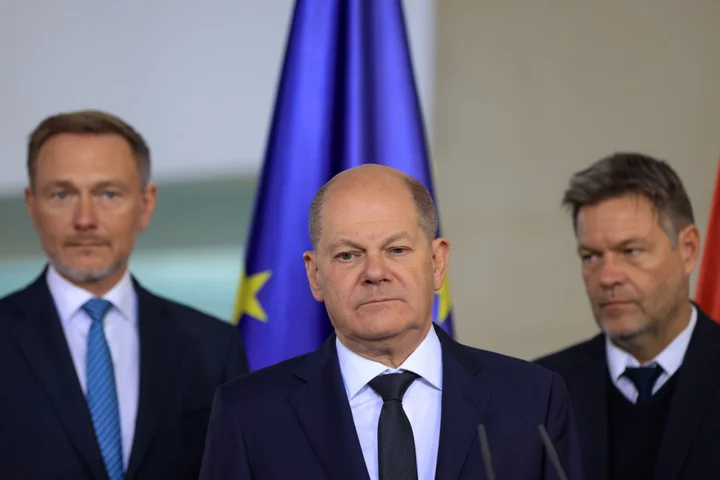A decision by Germany’s top court to strike down off-budget funding for climate action has called into question about €770 billion ($840 billion) of state funding, according to people familiar with the matter.
The Constitutional Court declared Wednesday that repurposing €60 billion of pandemic aid from 2021 to finance climate protection contravened Germany’s Basic Law. As officials from Chancellor Olaf Scholz’s administration began to digest more than 60 pages of legal arguments, they feared that similar vehicles providing as much as €770 billion in funding may have to be dissolved by the end of the year, according to people familiar with the government’s initial analysis.
Germany’s Federal Court of Audit in August listed 29 special funds outside the annual budget have accumulated €870 billion of funds. A €100 billion pot earmarked to upgrade the German military is likely safe, because it was written into the constitution last year, but the rest of the money is in jeopardy, the people said, asking not to be named discussing confidential analysis.
Those findings were based on a cursory study of the court decision and could still change once government lawyers have had time to digest the ruling.
The German cabinet was meeting when the court decision dropped. Scholz emerged with his two coalition partners shortly afterward and vowed to find a way to plug the immediate funding gap of €60 billion. The problem is that there is no obvious way to cover the shortfall and fractious relations between the chancellor and his allies are likely to make any compromises difficult.
Pro-business Finance Minister Christian Lindner is likely to veto any tax increases while cuts in social spending are out of the question for Scholz’s Social Democrats the Greens can’t support cutting environmental projects. The missing funds can’t be raised through new borrowing either — as Germany has just reinstated to a so-called debt brake enshrined in the constitution.
“The challenge is immense,” said Veronica Grimm, a member of Scholz’s panel of independent economic advisers.
In order to change the debt brake, the government would need a two-thirds majority in parliament - and that would require support from the opposition CDU/CSU conservatives who filed the lawsuit with the Constitutional Court.
The Greens are hit hardest by the ruling. They were promised sufficient funds for the decarbonization of the economy during coalition negotiations. The transfer of the €60 billion to the Climate and Transformation Fund (KTF) was a compromise between the three coalition partners. The special fund, which is worth €211.8 billion through 2027, was placed under Habeck’s Economy Ministry.
“An attempt could be made to interpret the scope of the debt brake more generously,” Grimm said. “However, this would only raise a few billion.”
The ruling is also a blow for Scholz who reallocated the funds in his role as finance minister in the previous government and didn’t make provisions for the judicial reversal. Lindner, for his part, has already pointed out in the past that it was Scholz who set up the structure.
All three coalition partners have always pointed to the KTF funding as evidence Germany is investing enough to meet its targets to transform its energy system. The pot is not only key to decarbonization. It is also earmarked for the expansion of the rail network and includes subsidies worth at least €10 billion to attract semiconductor manufacturers to settle in Germany.
Scholz and his partners managed to put on a display of solidarity appearing at a joint press conference after the court’s ruling. But the decision risks deepening the rifts between the three parties as they work through their assessment of just how big a financial setback they face and begin negotiations on where the funds should come from to cover the hole.
“The good news is that the fiscal rules can’t be circumvented at will,” said Grimm. “Our institutions to enforce this are working.”
--With assistance from Karin Matussek and Ben Sills.

